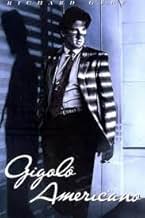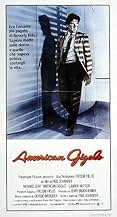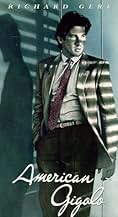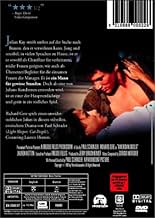ÉVALUATION IMDb
6,3/10
31 k
MA NOTE
Julian est un gigolo, qui aime son travail. Malheureusement, lorsqu'un de ses clients est tué, il n'a pas d'alibi.Julian est un gigolo, qui aime son travail. Malheureusement, lorsqu'un de ses clients est tué, il n'a pas d'alibi.Julian est un gigolo, qui aime son travail. Malheureusement, lorsqu'un de ses clients est tué, il n'a pas d'alibi.
- Prix
- 2 nominations au total
Nina van Pallandt
- Anne
- (as Nina Van Pallandt)
Patricia Carr
- Judy Rheiman
- (as Patti Carr)
Macdonald Carey
- Hollywood Actor
- (as MacDonald Carey)
Histoire
Le saviez-vous
- AnecdotesReportedly, one of the reasons John Travolta turned the film down was because he wanted final cut approval but director Paul Schrader would not give it to him. Travolta allegedly kept the Armani suits especially tailor-made for him in the film. The picture is one of at least four films that Gere has done after Travolta had turned them down, the others being Chicago (2002), Les moissons du ciel (1978), and Un officier et un gentleman (1982).
- GaffesAt 17:12, the helicopter carrying the camera is clearly reflected just above the right rear wheel of the Mercedes.
- Citations
Julian Kaye: Why me? Why did you pick me?
Leon: Because you were framable. You've stepped on too many toes. Nobody ever cared about you. I never even liked you much myself.
- Autres versionsABC edited 21 minutes from this film for its 1983 network television premiere.
- Bandes originalesThe Love I Saw in You Is Just a Mirage
by Smokey Robinson (as W. Robinson) and Marvin Tarplin (as M. Tarplin)
Performed by Smokey Robinson & The Miracles (as Smokey Robinson and The Miracles)
Courtesy of Motown Records
Commentaire en vedette
It's important that Paul Schrader put 'American' in his title. This isn't just something to make it a title that is easily recognizable or to know what country it's from. It's about an American state of being, what it is to be a gigolo who likes swanky suits and fast cars and, well, the women he gets what he has to work for. But what happens when this man's reputation is called into question, or what kind of reputation a gigolo has? Politics also comes into it, not too oddly enough, as Julian (Richard Gere) catches the eye of a woman who is married to a Senator. That the movie is technically a murder mystery, sort of, as Julian is accused of killing a woman who he had seen previously as a 'fetish' customer, is almost besides the point. It is good for the plot, but what Julian has to focus on, the big question for him, is what is he doing with himself? How do other people look at him?
He makes himself a sex symbol, of sorts, as he works out religiously and always gets the best clothes (like a peacock perhaps). Schrader puts a lot of focus on the relationship Julian has with Michelle, who genuinely cares about him and is probably the only person he knows who is straight with him (certainly not the pimp played by Bill Duke, or his mentor who has her own gaggle of men and women to 'send out'). Of course sexuality plays into it, but I liked the fact that Schrader didn't focus squarely on it. He's interested in some of the mechanics of it (there's a scene where Julian/Michele do it, but it's shot much in the way of Godard's A Married Woman, lots of single shots of body parts, some flesh, but selective eroticism), and then, mostly, the consequences.
But, again, the look of the film should be an indicator. This is Los Angeles of 1979/1980, but it portends the future decade not just in the city but in the kind of middle-upper (or just upper) class lifestyle of expensive restaurants, good drinks, good clothes, and sometimes good women (or just lonely older women). Schrader even has a way of looking ahead to the future with Giorgio Moroder's score, which takes Blondie's "Call Me" and turns it into a synth score full of dread and mystery and drama. On top of how the look, its stylish exteriors and careful lighting (the Bruckheimer look before Tony Scott took it over with smoke machines), and the depth of the script, Gere is also fantastic here. He was on a roll right after Days of Heaven, and here he lights up the screen with charisma, pathos, intensity, and a sense of where to take the scenes where they need to be.
He, much like the environment around him, makes up what is the backdrop for a tale of morality in high society, hypocrisy where it may lay in the highs and lows, and what it means to fall in love. The only part it doesn't fully work is as a full-fledged thriller (again, the murder-mystery element is the weakest link), but everything else sparks the screen with interest and excitement.
He makes himself a sex symbol, of sorts, as he works out religiously and always gets the best clothes (like a peacock perhaps). Schrader puts a lot of focus on the relationship Julian has with Michelle, who genuinely cares about him and is probably the only person he knows who is straight with him (certainly not the pimp played by Bill Duke, or his mentor who has her own gaggle of men and women to 'send out'). Of course sexuality plays into it, but I liked the fact that Schrader didn't focus squarely on it. He's interested in some of the mechanics of it (there's a scene where Julian/Michele do it, but it's shot much in the way of Godard's A Married Woman, lots of single shots of body parts, some flesh, but selective eroticism), and then, mostly, the consequences.
But, again, the look of the film should be an indicator. This is Los Angeles of 1979/1980, but it portends the future decade not just in the city but in the kind of middle-upper (or just upper) class lifestyle of expensive restaurants, good drinks, good clothes, and sometimes good women (or just lonely older women). Schrader even has a way of looking ahead to the future with Giorgio Moroder's score, which takes Blondie's "Call Me" and turns it into a synth score full of dread and mystery and drama. On top of how the look, its stylish exteriors and careful lighting (the Bruckheimer look before Tony Scott took it over with smoke machines), and the depth of the script, Gere is also fantastic here. He was on a roll right after Days of Heaven, and here he lights up the screen with charisma, pathos, intensity, and a sense of where to take the scenes where they need to be.
He, much like the environment around him, makes up what is the backdrop for a tale of morality in high society, hypocrisy where it may lay in the highs and lows, and what it means to fall in love. The only part it doesn't fully work is as a full-fledged thriller (again, the murder-mystery element is the weakest link), but everything else sparks the screen with interest and excitement.
- Quinoa1984
- 28 juill. 2010
- Lien permanent
Meilleurs choix
Connectez-vous pour évaluer et surveiller les recommandations personnalisées
Détails
- Date de sortie
- Pays d’origine
- Site officiel
- Langues
- Aussi connu sous le nom de
- American Gigolo
- Lieux de tournage
- Sunset Plaza Apartments - 1220 Sunset Plaza Drive, Mt. Olympus, Hollywood Hills, Los Angeles, Californie, États-Unis(Westwood Apartment Hotel, demolished 1987 and replaced by a totally different building - see GE at the actual address)
- sociétés de production
- Consultez plus de crédits d'entreprise sur IMDbPro
Box-office
- Budget
- 4 800 000 $ US (estimation)
- Brut – États-Unis et Canada
- 22 743 674 $ US
- Fin de semaine d'ouverture – États-Unis et Canada
- 3 559 930 $ US
- 3 févr. 1980
- Brut – à l'échelle mondiale
- 22 745 134 $ US
Contribuer à cette page
Suggérer une modification ou ajouter du contenu manquant

Lacune principale
What was the official certification given to Le gigolo américain (1980) in Mexico?
Répondre




































